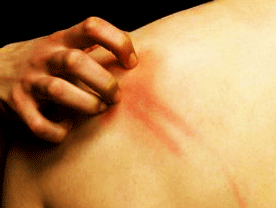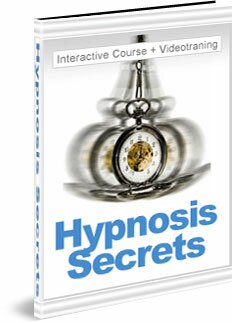How To Stop Itching & Scratching
It could drive you mad. This itching that just won’t go away. Even if you muster up all your willpower to NOT scratch – how long can you really do this?
The thing with itching is that it doesn’t just go away. It is easy to lift a heavy item once and put it down again. And if the itch would be just a short phenomenon, it would be a lot easier to not scratch. But how about lifting a heavy item and holding it for ten minutes? Or twenty? Or an hour? Or even more? The muscles just tire. And the same thing happens to our willpower. We simply can not force us not to scratch if we feel itchy.
You already know that scratching doesn’t really help. Yes, it feels good for a moment. It provides temporary relief from something that is annoying you. But in the long term, it isn’t making things better. Quite the opposite. It’s making things worse, because the more you scratch, the more you upset and irritate your skin. And the itchier it will be in the future.
Maybe other people have already noticed your scratching problem. If you have a partner, he or she surely has, because it might cause scratch scars on your skin. And these scars are very difficult to get rid of. Frantic scratching can cause permanent skin damage and can make your skin thick and leathery.
If other people who care about you noticed your scratch problem, they have probably told you to stop it. Maybe they were even upset at you when they told you again and again and then they still caught you scratching yourself.
But what can you do? They don’t know how to stop the itching either. Should you wear boxing gloves so you can’t scratch yourself? Tie your hands behind your back? How to stop yourself from scratching an itch?
One thing you can do is to try to put some essential oil or balm onto the areas that itch. Sandalwood paste is also very effective when it comes to stopping itchiness.
But if you’ve scratched yourself habitually, then you have turned it into a habit. And habits don’t die easily.
 The fact is, you don’t really have conscious control over your scratching behavior. Yes, sometimes you might muster up all your willpower and force yourself not to scratch, but we already know that your ability to do that is limited.
The fact is, you don’t really have conscious control over your scratching behavior. Yes, sometimes you might muster up all your willpower and force yourself not to scratch, but we already know that your ability to do that is limited.
So you need some help. And that help isn’t some new anti-itch cream. But how to stop an itch without scratching?
Did you ever cut yourself without noticing it? Maybe a paper cut? Almost everybody has. Only later when you saw the cut did you start to notice it. Our brains are able to “switch off” certain sensations. There are people who can perform amazing stunts, like piercing their bodies with sharp objects, without feeling pain. Some dentists use hypnosis on their clients instead of anesthesia, so that their clients don’t feel any pain.
And your brain is capable of doing the same thing with your itchiness. If you don’t feel that your skin is itchy, is it still a problem? No, it isn’t. In fact, if you don’t feel that your skin is itching, and as a result you don’t scratch, then it is good for you and your skin to not feel the itch. Hypnosis can switch off your itching feeling, so that you don’t have to try to give up scratching.
![]() Stop Scratching Hypnosis Download
Stop Scratching Hypnosis Download
What causes chronic itching?
There are three main causes of chronic itching, and we’ll take a quick look at some of them.
One is eczema, a term that describes a wide variety of inflammations of the skin’s outer layer (the epidermis). Eczema is most often caused by allergic reactions to food (see infobox: Foods That Make You Itchy).
Another cause of itchiness is contact dermatitis – this is when comes in contact with allergens or irritants. If you become more itchy when exposed to sunlight, then it’s probably what medical professionals refer to as phototoxic dermatitis – this means the allergens or irritants which are in contact with your skin get activated by sunlight.
Psoriasis is another common cause of itchiness, and about 2% of all the people in America suffer from psoriaris.
There are many kinds of external triggers for itchiness. Among the most common ones are chemicals in laundry detergents and soaps and other household chemicals.
Skin & Psyche
There is a strong link between skin and psyche. Especially in eczema, stress plays a major role. That’s one of the reasons why hypnosis for itching has such a high success rate.
Most people with itchy skin notice that the symptoms get worse when they are stressed, feel angry, upset, depressed, scared or anxious.
One of the reasons why stress can have this effect on your skin is because it releases neuropeptides. Neuropeptides are molecules that your nerve cells use to communicate with each other – and they are also involved in causing inflammatory responses in your skin (which is what makes you feel itchy).
Dr. Richard G. Fried, MD said on a medical meeting in New York 2011 that “[...]when psoriasis patients feel stressed about their condition, it can aggravate their symptoms and lead to a further decline in their emotional state, which becomes a vicious cycle”.
Dermatologists know that stress can make the skin more sensitive and impair its protective functions, thus also increasing feelings of itchiness. And in fact what we often see in patients is that when they are stressed their skin itching worsens, which causes them yet more emotional stress, which makes the itching worse again – it’s a vicious cycle.
Hypnosis to stop itching is the ideal way to break this vicious cycle, because one of the things it does is to improve the emotional states of the patient and utilize subconscious processes to promote healthy skin function and reduce the itch.
Perfumes can also make you feel itchy.
The reason why these chemicals make you feel itchy is because your body “recognizes” them as intruders – and then try’s to get red of these substances. How does your body try to get rid of them? By initiating an inflammatory response, which makes you feel itchy.
Common ingredients in cosmetic products like benzyl alcohol, wood tars, eugenol, coumarin and geraniols often play a role in the triggering of itchiness.
But natural irritants can be an issue too, particularly animal dander, as well as metals (particularly nickel which is often mixed into jewelry)
So how to stop itchiness?
Well, doctors usually prescribe hydrocortisone cream or a corticosteroid or an emollient unscented lotion. However, while this might help to keep the symptoms at bay in the short run, in the long run it can cause more harm than good.
There are many side effects when you use steroid creams over a long period. It can weaken your skin; making it dry, thin, bristle and in the long run (paradoxically) more itchy.
If the cause of your itchiness is psoriasis then you might want to try UV light therapy – which can help to keep symptoms at bay.
Foods That Make You Itchy
What exactly triggers your allergic reaction can vary widely, but the most common foods that make people feel itchy are: seafood (particularly shellfish like shrimps, lobsters and prawns), nuts, wheat, eggs and fruits.
Also when you generally eat a lot of processed foods and a diet which consists of a lot of sugar that can contribute to your risk of developing skin problems. If you think that artificial sweeteners are a better choice, please consider that many people who consume high amounts of the common sweetener aspartame report severe itchiness. There is a theory that aspartame creates metabolites which are then excreted by your body into the skin – which is what makes you feel itchy.
Anti-Itchy Diet
There are a couple of things that you should reduce (or if possible avoid) to reduce your itchiness.
So here is the Do-Not-Eat-List:
- foods that contain high amounts of sugar, high-fructose corn syrup or artificial sweeteners
- foods that contain wheat (white bread, cake, pizza, cookies, etc.)
- canned foods
- foods that trigger allergic reactions for you (best way to find out is to test by eliminating them from your diet completely and then reintroducing them suddenly to see if it has any effect on your symptoms). Most probably candidates are seafood (particularly shellfish), nuts, wheat.
The Yes-Please-Eat-This-List:
- green leafy vegetables, carrots, dried beans
- probiotics to help maintain a healthy intestinal flora
- seeds, nuts (if not allergic!), fresh organic vegetables, whole grains
- high-quality flaxseed oil (rich in healthy fats like omega-3 and omega-6)
- magnesium supplements.
Jessica was a patient who often felt itchy, but it was worst when she was sweating – then her skin felt itchy and burning. She once described it like this: “It’s as if acid comes out of my sweat pores!”
A dermatologist has recommended her to use a hydrocortisone cream, but so did another dermatologist for a skin condition which the doctor was even unable to diagnose a while before, and she kind of felt that this wouldn’t help her.
When she tried to use hypnosis for scratching she felt it to be relaxing, but it didn’t seem to have the profound psychological effect that she had hoped for. But she continued to listen to the hypnosis download on a daily basis before going to sleep (as recommended) for 10 days, in conjunction with adjustments in her diet.
One thing she noticed was that the hypnosis helped her to remain more relaxed throughout the day, and to also make healthier food choices.
And somehow she noticed she felt itchy less often – and didn’t feel the urge to scratch herself as much as before.
Over time, this trend continued and she has now successfully overcome her scratching habit.
![]() Stop Scratching Hypnosis Download
Stop Scratching Hypnosis Download
If you also have tips or questions, please share them in the comment section below ![]()



{ 4 comments… read them below or add one }
Sometimes the itching really drives me crazy. Would be great if this hypnosis thing works, although I can’t imagine anything that could help.
Hi Elaine,
I understand your grievances, and it’s normal to think that nothing will help, especially not something that’s “just about your head”. But the good thing is you really don’t need to believe in hypnosis, if you just use it, it will work
Bob
It’s funny, because I use hypnosis downloads often, but one thing I noticed is that I sometimes feel a tingling or itching when I go into a hypnotic trance state. I don’t have a problem with itching in general, and it’s not something that’s really annoying me too much, but I’m wondering why is it that I often experience this itch during hypnosis?
Hi Michael,
that’s an interesting phenomenon, and I’ve often observed it in people who go into hypnotic trance states. There could really be several reasons for this. Did you know that people sometimes have an itching sensation in their nose when they lie? Now I’m not saying that you’re lying, I’m saying there might be a similar underlying mechanism. When people lie and they feel uncomfortable or conflicted about the lie, then they have a (very tiny, but nonetheless noticeable) histamine reaction, which can cause an itchy sensation in their nose. I would have to know the details of your situation to make a better educated guess, but it could be that there is some kind of internal conflict that flares up when you go into a relaxed hypnotic trance state.
Hypnotic regards,
Bob